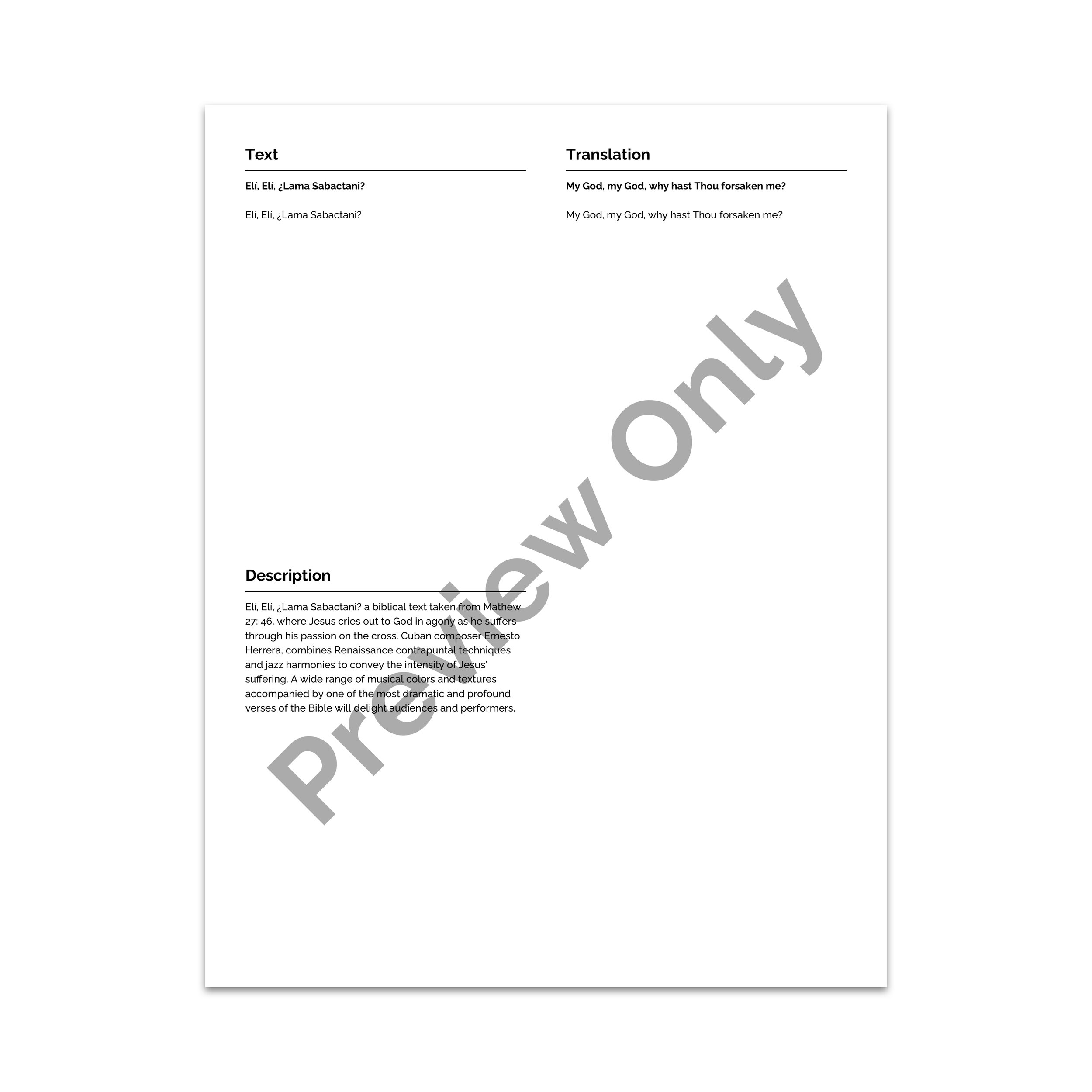Elí, Elí, ¿Lama Sabactani? by Ernesto Herrera
Elí, Elí, ¿Lama Sabactani? a biblical text taken from Mathew 27: 46, where Jesus cries out to God in agony as he suffers through his passion on the cross. Cuban composer Ernesto Herrera, combines Renaissance contrapuntal techniques and jazz harmonies to convey the intensity of Jesus’ suffering. A wide range of musical colors and textures accompanied by one of the most dramatic and profound verses of the Bible will delight audiences and performers.
Elí, Elí, ¿Lama Sabactani? a biblical text taken from Mathew 27: 46, where Jesus cries out to God in agony as he suffers through his passion on the cross. Cuban composer Ernesto Herrera, combines Renaissance contrapuntal techniques and jazz harmonies to convey the intensity of Jesus’ suffering. A wide range of musical colors and textures accompanied by one of the most dramatic and profound verses of the Bible will delight audiences and performers.
Elí, Elí, ¿Lama Sabactani? a biblical text taken from Mathew 27: 46, where Jesus cries out to God in agony as he suffers through his passion on the cross. Cuban composer Ernesto Herrera, combines Renaissance contrapuntal techniques and jazz harmonies to convey the intensity of Jesus’ suffering. A wide range of musical colors and textures accompanied by one of the most dramatic and profound verses of the Bible will delight audiences and performers.
“The appeal of Ernesto’s composition lies in its gorgeous harmonies...”
Product Details
Recordings
Performed by BYU Singers - Dr. Andrew Crane, Director
Transcription
Aramaic
Elí, Elí, ¿Lama Sabactani?
Text taken from the Reina-Valera Bible (RVR 1960)
English
My God, my God, why hast Thou forsaken me?
Composition
BYU Singers performed Elí, Elí, ¿Lama Sabactani? in March 2021, during a time when many choirs will still not meeting due to the COVID pandemic. The group rehearsed and performed the piece entirely while wearing masks, and sang it for an audience over live-stream only. For many online commenters who watched the concert, it was the audience’s favorite piece of the evening. And I took a poll of the students at the end of that school year, and it was by far the choir’s favorite piece that they had sung.
I think the appeal of Ernesto’s composition lies in its gorgeous harmonies and the way the composer weaves gripping suspensions amongst the polyphonic vocal lines. Its dense vocal textures and expansive range create an atmosphere of angst and drama, perfectly suited to the pleading text.
Andrew Crane, Director
BYU Singers
Composer
Ernesto Herrera born in 1988 at La Habana begins his musical career as a singer, composer, and arranger in his native Cuba. He has received awards for best arrangement at the Jalisco Canta competition in Mexico and for best original composition and arrangement at the Electo Silva competition in Cuba. Ernesto has offered masterclasses and workshops in Colombia and Mexico. His choral works have been published in the US, where he currently lives and serves as composer-in-residence for Vallejo Drive Church in Glendale, California.
Publisher
La Voz Music Publishing








